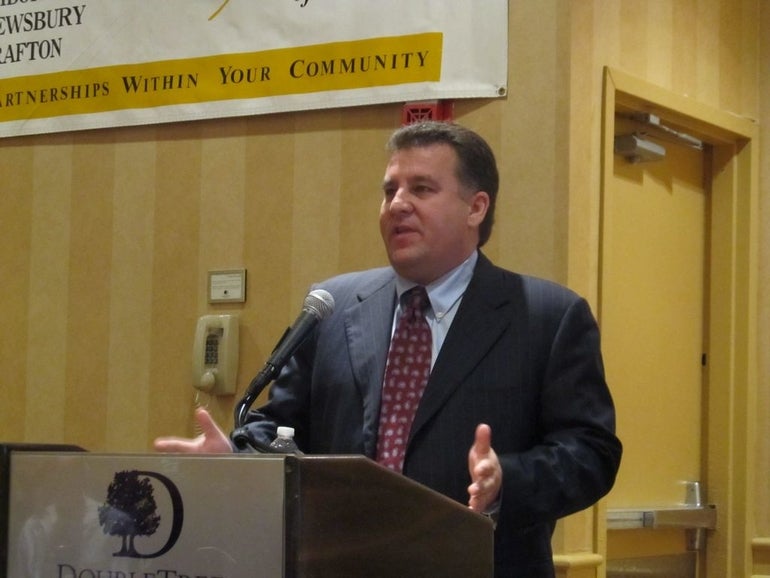The Massachusetts economy has outpaced the national economy in seven of the past 10 fiscal quarters, but businesses here shouldn’t get overly content, economist Michael Goodman told members of the Corridor Nine Area Chamber of Commerce in Westborough this morning.
“Massachusetts can’t maintain this pace forever because ultimately the firms and other nations buying our goods and services have to have some to sell their products to,” said Goodman, a professor at UMass Dartmouth.
Decision makers on both sides of the Atlantic could have a significant impact on the state economy in the coming year, Goodman said. The yet unresolved European fiscal crisis has the potential to disproportionally affect Massachusetts, which sells approximately 40 percent of its exports to European countries, compared to 20 percent from the entire United States.
And as a presidential election looms, Goodman noted that Congress has not reached a solution to the so-called “fiscal cliff,” a term used to describe large federal budget cuts coupled with scheduled tax increases.
“We find ourselves doing reasonably well here in Massachusetts, but we’re buffeted by these economic headwinds,” Goodman said.
An Uneven Recovery
Goodman noted that, while the stock market and corporate profits have recovered nicely from the recession, unemployment and the housing market are showing only gradual improvements.
“Where is this money going?” Goodman asked. “Well, it’s not going back to add people back to the payrolls to the extent it has historically. It’s been going, until quite recently, in large volumes back into investments in the equipment and technology that allow businesses to meet the needs of their customers with the same or fewer employees.”
That benefits those in the technology, IT and advanced manufacturing sectors, but more traditional sources of middle-class income, such as construction jobs, have been left behind.
And it’s not just the type of business that matters, Goodman said. Geographic regions have also been left behind, largely because they lack educated populations.
“We’re seeing these divergences both industrially and nationally,” he said. “So we’ve got a real challenge.”
Lost Wealth Means Changed Behavior
American households lost approximately $7 trillion in wealth during the recession, largely in the form of home equity.
“When you take that much out of the economy, you’re going to feel it,” Goodman said.
Homeowners have been tightening their belts. Goodman presented data showing that debt service payments as a percentage of disposable income has fallen drastically, meaning people are paying off credit card balances.
But that has hurt businesses because they have lost customers who formerly subsidized their purchases with credit or equity.
“In the short term, that has an economic cost, Goodman said.
Read more

